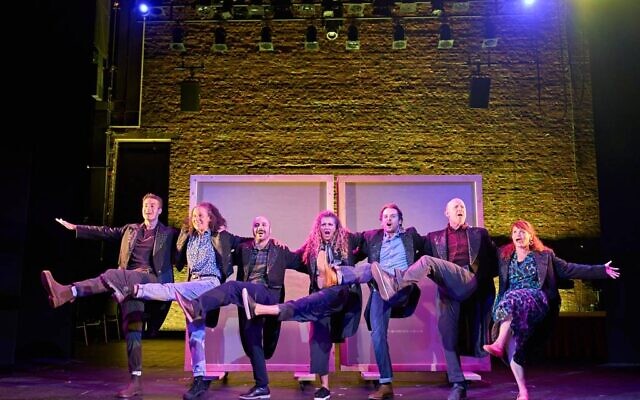‘A bit like shul on yomtov’: a visit to Jews. In Their Own Words. at the Royal Court
Jonathan Freedland's West End play gives the stage to 12 Jewish voices he interviewed about antisemitism
The atmosphere at the opening night at the Royal Court felt a bit like shul on yomtov: groups of two or three, tickets in hand, smiling and nodding at familiar faces, and chatting a lot both before and after; and when it was over, moving to another room – in this case the bar – for a noisy kiddush.
No wonder it was so loud. What is happening is wonderful and needs to be discussed. Less than a year after the theatre admitted to ‘unconscious bias’ – the perpetuation of an antisemitic trope – it is putting on a play that can be seen as a genuine act of atonement.
And, more wonderful, this ‘theatrical inquiry’, as it is being called, is the debut play by Jonathan Freedland, the hugely respected Guardian journalist and writer known for his pitch-perfect analyses of current affairs. I went first with my daughter, who hadn’t known about the background. So I told her that the production was a response to the outrage about Rare Earth Mettle: word had spread during rehearsals that the odious character of a greedy billionaire (who was not Jewish) had been given the name Hershel Fink.
There was an outcry from Jews, and a last-minute change (to Henry Finn). As well as being an apology from the theatre and its artistic director, Vicky Featherstone, who co-directs alongside Audrey Sheffield, Jews. In Their Own Words. is an exploration of contemporary antisemitism, and a plea to make that antisemitism stop.
Freedland has created – from an idea by Tracy-Ann Oberman – a verbatim drama, using interviews he conducted with 12 Jews; many of them, including Howard Jacobson, Margaret Hodge and Luciana Berger, were there for the opening (press) night, which I also attended.
The congregation comprised many other familiar faces, including David and Ivor Baddiel, Rob Rinder and Michael Grade, as well as plenty of less famous Jews.
That most of the interviewees are public figures, but ones in whose personal experiences we share, makes this drama as hot a ticket as a seat in the main shul: and it resonates. Not that the resonance is comfortable; some scenes are deeply unsettling.
While the interviews were done individually, Freedland writes the characters on stage together to create a mostly flowing quasi-dialogue, and with episodes of ironic humour: during a discussion of conspiracy tropes, they become a high-kicking chorus line, singing a rather (too) catchy number, “It’s the Jews that did it, those dirty stinking Jews.”
That got a big round of applause on the opening night, and I did find myself singing it afterwards. In more sincere mode, the characters’ conversation shifts from the tropes of money, blood and power to responses of non-Jews to accusations of antisemitism, including the inevitable: “But my problem is not Jews, it’s Israel.”
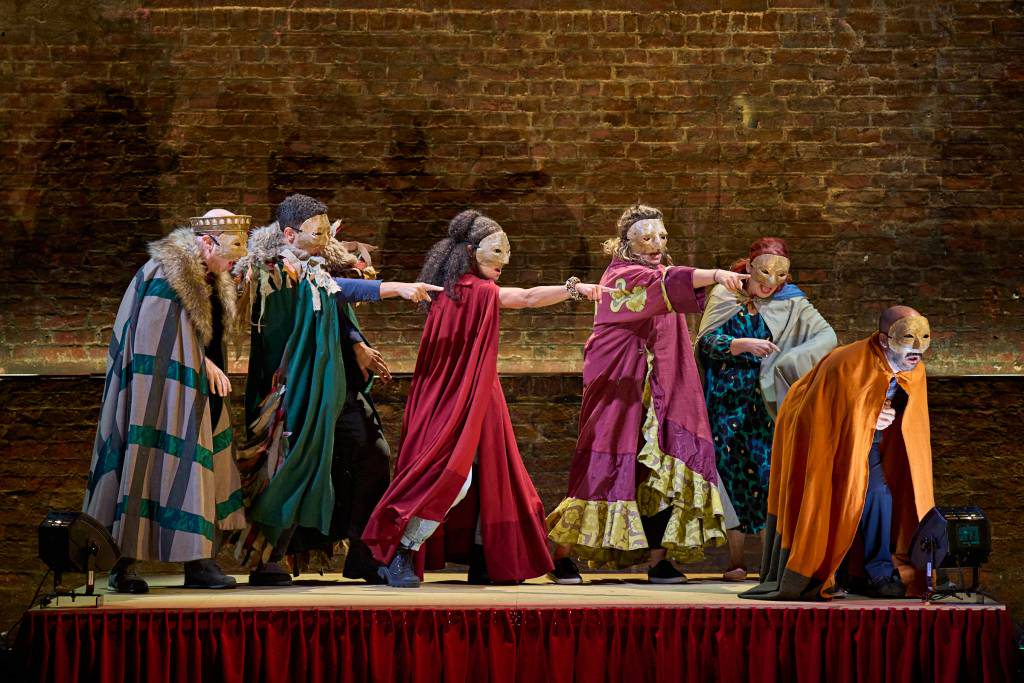 But it is the monologues that contain the most interesting and troubling stories, this time beyond the experience of most of us. Businessman and philanthropist Edwin Shuker (played by Hemi Yeroham) tells of seeing the public hanging of Jews in his native Iraq, Hodge (Debbie Chazen) describes hostile officials visiting her first-generation parents’ home to check how English they are, and Luciana Berger – in a speech delivered by Louisa Clein with a searing emotional intensity – recalls being threatened, abused and hounded out of the Labour Party by supporters of Jeremy Corbyn.
But it is the monologues that contain the most interesting and troubling stories, this time beyond the experience of most of us. Businessman and philanthropist Edwin Shuker (played by Hemi Yeroham) tells of seeing the public hanging of Jews in his native Iraq, Hodge (Debbie Chazen) describes hostile officials visiting her first-generation parents’ home to check how English they are, and Luciana Berger – in a speech delivered by Louisa Clein with a searing emotional intensity – recalls being threatened, abused and hounded out of the Labour Party by supporters of Jeremy Corbyn.
One problem for the play is the make-up of the audience; the people who need to see it probably won’t. Guardian opinion writer Polly Toynbee was at the opening. (Full disclosure: I also work for the paper.) But its theatre critic seemed to argue with Jacobson’s description of Caryl Churchill’s Seven Jewish Children – which played at the Royal Court in 2009 – as ‘medieval’, and her online review is hyperlinked to a defence of it by the writer and director.
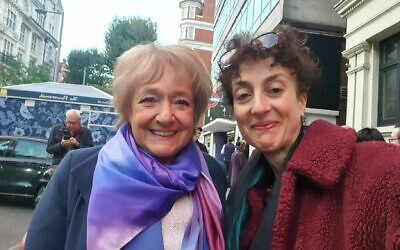
That question of who would see the play is one I discussed with Margaret on the tube home. She rightly suggested that rather than stay in London, it needed to tour the country. Only by reaching an audience beyond shul-goers can this play hope to fulfil the intention its super-punctuated title suggests: of ‘putting a full stop’ to antisemitism. The final scene, in which the actors break the fourth wall to reveal that they are all Jewish, is certainly a moving finale to a wonderful moment for the Royal Court, and one which may prove to be a turning point for the theatre.
Normal makes a difference
by Nicole Lampert
“It is one of the most surreal things to ever happen to me,” says Victoria Hart, who is one of the ‘normal’ Jews depicted in Jonathan Freedland’s Royal Court experience featuring such luminaries as Howard Jacobson and Luciana Berger.
“There’s all these famous people and then there is someone playing me – using words I actually said. Obviously, I knew it was going to be there; I’d had transcripts sent to me to check. But seeing an actress play me was something else entirely.”
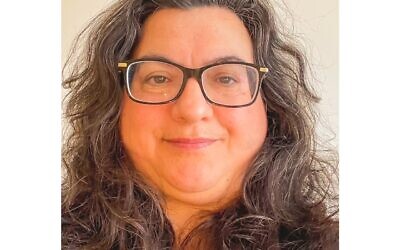
Victoria, a social worker who lives in South London was introduced to Freedland thanks to the Jewish News. The Guardian journalist was in the middle of writing his play – in which themes of contemporary antisemitism are explored – when I interviewed him about his Holocaust book The Escape Artist for this newspaper. He said he was looking for ordinary people who had learned to speak out more about their Judaism over the Corbyn years and I gave him the details of Victoria, whose experiences of antisemitism in the social worker world led her becoming a founding member of the NHS Jewish Network.
Some of her scenes – from her anger at a swastika being scratched onto her father’s car when she was a child to the moment when a fellow social worker loudly talked in the office about how the Jewish woman she’d recently been to see must have been lying or have hidden her money because everyone knew all Jews were rich – are among the hardest hitting in what is, at times, a tough watch.
“When I was interviewed by Jonathan I’d just finished at a social worker’s conference where there’d been a big row over the IHRA definition of antisemitism and it had been so bruising,” she recalls. “Someone was siting next to me and said, ‘Oh you can’t criticise Israel or they’ll come and get you booted out of your job’. I’d had to explain – like we all have to explain – the difference between criticising the Israeli government and the existence of Israel. And in the end, it was a real eye opener for her – I don’t think she’d ever met a Jewish person before.
“Sometimes I feel charitable about this kind of stuff – yes, we need to educate people. But other times I am angry – it shouldn’t be my duty to make people aware of this – they should know better. When that thing happened to me – when my colleague talked about the Jews and their money and no one spoke up against it – I didn’t speak either. But after that I vowed to always tell people that I was Jewish, partly because I didn’t want to hear antisemitism like that being said in front of me.”
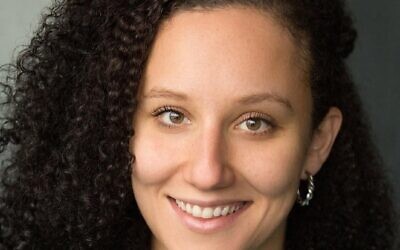
Victoria saw the show, in which she is played by Rachel-Leah Hosker, just before opening night and says she hopes it will make some sort of difference. “I think it will have an impact,’ she says. “For us, as Jews, it does at least acknowledge what has gone on – someone is listening to us. And for people on the outside, I hope there is a greater understand of what antisemitism is and how it is still with us.”
• Jews. In Their Own Words. is at the Royal Court until 22 October. Book
at royalcourttheatre.com

Thank you for helping to make Jewish News the leading source of news and opinion for the UK Jewish community. Today we're asking for your invaluable help to continue putting our community first in everything we do.
For as little as £5 a month you can help sustain the vital work we do in celebrating and standing up for Jewish life in Britain.
Jewish News holds our community together and keeps us connected. Like a synagogue, it’s where people turn to feel part of something bigger. It also proudly shows the rest of Britain the vibrancy and rich culture of modern Jewish life.
You can make a quick and easy one-off or monthly contribution of £5, £10, £20 or any other sum you’re comfortable with.
100% of your donation will help us continue celebrating our community, in all its dynamic diversity...
Engaging
Being a community platform means so much more than producing a newspaper and website. One of our proudest roles is media partnering with our invaluable charities to amplify the outstanding work they do to help us all.
Celebrating
There’s no shortage of oys in the world but Jewish News takes every opportunity to celebrate the joys too, through projects like Night of Heroes, 40 Under 40 and other compelling countdowns that make the community kvell with pride.
Pioneering
In the first collaboration between media outlets from different faiths, Jewish News worked with British Muslim TV and Church Times to produce a list of young activists leading the way on interfaith understanding.
Campaigning
Royal Mail issued a stamp honouring Holocaust hero Sir Nicholas Winton after a Jewish News campaign attracted more than 100,000 backers. Jewish Newsalso produces special editions of the paper highlighting pressing issues including mental health and Holocaust remembrance.
Easy access
In an age when news is readily accessible, Jewish News provides high-quality content free online and offline, removing any financial barriers to connecting people.
Voice of our community to wider society
The Jewish News team regularly appears on TV, radio and on the pages of the national press to comment on stories about the Jewish community. Easy access to the paper on the streets of London also means Jewish News provides an invaluable window into the community for the country at large.
We hope you agree all this is worth preserving.


